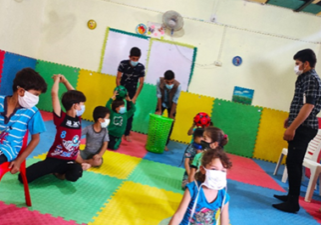News > Blog
The Global Food Security Act — Reaffirming the United States’ Commitment to End World Hunger
Published 10/23/2018 by globalcommunities
The Global Food Security Act — Reaffirming the United States’ Commitment to End World Hunger
By David A. Weiss, President and CEO, Global Communities
The US House of Representatives passed the Global Food Security Reauthorization Act, which President Trump recently signed. The reauthorization of this important piece of bipartisan legislation demonstrates the United States’ commitment to fighting global hunger, poverty and malnutrition.
Currently, nearly 800 million people do not get enough food to eat. At the same time, world population is expected to reach nine billion people by 2050. According to the United Nations Food and Agriculture Organization, global food production will need to increase by 70 percent to meet growing needs. Chronic hunger and malnutrition are scourges that lead to poor health, rob people of their economic potential and leave them unable to contribute to growth and development of their communities.
First passed in 2016, the Global Food Security Act (GFSA) marked a shift in the way the United States supports food security. The GFSA outlines a comprehensive approach to agricultural development and humanitarian relief that promotes working with a cross-section of U.S. government agencies as well as country governments, nongovernmental and civil society organizations, universities and research institutions, businesses, multilateral institutions, and the farmers themselves. With a focus on the role of women, nutrition, technology, markets, agricultural value chains and trade, the GFSA supports mechanisms to build self-sufficiency and reduce reliance on external food assistance.
The bipartisan support and passage of the Global Food Security Reauthorization Act helps cement the United States’ role as the leader in combating world hunger by extending Feed the Future, the government’s global hunger and food security initiative, until 2023. Since 2011, Feed the Future has been making measurable progress towards U.S. foreign policy goals by helping countries to build economic and food security and transition away from foreign assistance. By helping farmers and households develop the knowledge, skills and resources they need to be more resilient, Feed the Future programs have reduced poverty, decreased child malnutrition and stunting, boosted agricultural production and facilitated access to credit and loans.
As an international development organization, we see the result of the U.S. government’s commitment to end hunger first-hand. In Ghana, Global Communities is working with families like Nlangmal’s through the Ghana Resiliency in Northern Ghana (RING) project. Supported by USAID and Feed the Future, RING helped Nlangmal and other women in her village set up a village savings and loan group. With some basic training in financial management, Nlangmal was able to start saving a little bit each month. These modest savings changed her life. With a loan and her savings, she was eventually able to set a set up a small shop which increased her regular income. As a result, when her son suddenly fell seriously ill, she didn’t think twice about taking him to the district hospital — an uncommon luxury that she was able to afford only because she had extra money on hand. There, he was diagnosed with a condition requiring a blood transfusion — a costly procedure, which ultimately saved his life.
Nlangmal’s next major expense was a bicycle for her daughter Joyce. Before owning the bike, Joyce had to walk more than 15 miles a day to get to school. Despite setting out just after dawn each morning, she was constantly late. She regularly missed the first class and was punished for being tardy. With the bicycle, Joyce is the first to arrive on campus, helping her achieve a remarkable improvement in her school performance. She has become such a role model that the student body voted her Girls’ Prefect — equivalent to being elected class president.
Helping people develop the capacities and skills to feed themselves is not just a moral issue, it also has important geo-political ramifications. Food scarcity and loss of farming livelihoods can exacerbate migration, political instability and conflict. For these reasons, boosting international food security is in the economic and national security interests of the United States.
With the reauthorization of the Global Food Security Act, Feed the Future and other U.S. agencies have the mandate to continue their life-saving and life-changing work around the world. We applaud Congress for reaffirming the United States’ commitment and demonstrating global leadership in food security.






